2017-2018学年人教版初中英语七年级上册期中期末全套课时复习课件:Unit 7 Section B (2a-2c)
合集下载
2017-2018学年人教版初中英语七年级上册期中期末全套课时复习课件:Unit 7 Section A (1a-2e)
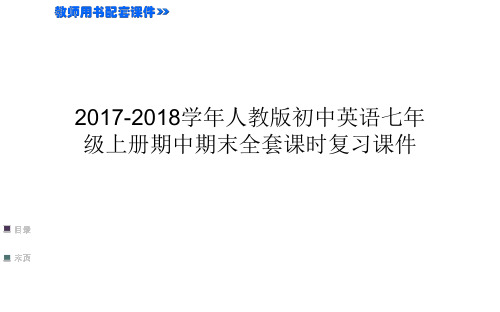
请把我的书包带到教室去好吗? (2) take表示“花费”之意。 It takes me an hour to do homework every day. 我每天花费一小时做作业。
【学以致用】 —The bananas are two dollars.
如果你不想做就不必做。
【自主归纳】 (1) need为实义动词, 意为“需要”, 有人称和数的变化, 后面
可接名词、代词、动名词及动词不定式; 可用于肯定句、疑问
句和否定句中。 Tom needs to buy a new pen today. 汤姆今天需要去买一支新钢笔。
(2) need可作情态动词, 意为“需要”, 无人称和数的变化, 后 接动词原形, 变为否定句时要在need后加上not; 变为疑问句时,
2. Can I help you? 我能帮您吗? 【句型剖析】 (1) Can I help you? 是服务人员或营业员主动询问顾客需要的 常用语, 类似的说法还有“May I help you? ”和“What can I
do for you? ”
(2) 如果顾客需要购物时, 可回答: Yes, please. 否定回答可用: No, thanks.
2017-2018学年人教版初中英语七年 级上册期中期末全套课时复习课件
Unit 7
How much are these socks? Section A (1a—2e)
Ⅰ. 单词拼写
1. sock (n. )
2. T-shirt (n. ) 3. sweater (n. ) 4. trousers (n. ) 5. shoe (n. )
*How much milk is there in the glass? 玻璃杯里有多少牛奶?
【学以致用】 —The bananas are two dollars.
如果你不想做就不必做。
【自主归纳】 (1) need为实义动词, 意为“需要”, 有人称和数的变化, 后面
可接名词、代词、动名词及动词不定式; 可用于肯定句、疑问
句和否定句中。 Tom needs to buy a new pen today. 汤姆今天需要去买一支新钢笔。
(2) need可作情态动词, 意为“需要”, 无人称和数的变化, 后 接动词原形, 变为否定句时要在need后加上not; 变为疑问句时,
2. Can I help you? 我能帮您吗? 【句型剖析】 (1) Can I help you? 是服务人员或营业员主动询问顾客需要的 常用语, 类似的说法还有“May I help you? ”和“What can I
do for you? ”
(2) 如果顾客需要购物时, 可回答: Yes, please. 否定回答可用: No, thanks.
2017-2018学年人教版初中英语七年 级上册期中期末全套课时复习课件
Unit 7
How much are these socks? Section A (1a—2e)
Ⅰ. 单词拼写
1. sock (n. )
2. T-shirt (n. ) 3. sweater (n. ) 4. trousers (n. ) 5. shoe (n. )
*How much milk is there in the glass? 玻璃杯里有多少牛奶?
七年级英语上册人教版期中综合复习精美课件
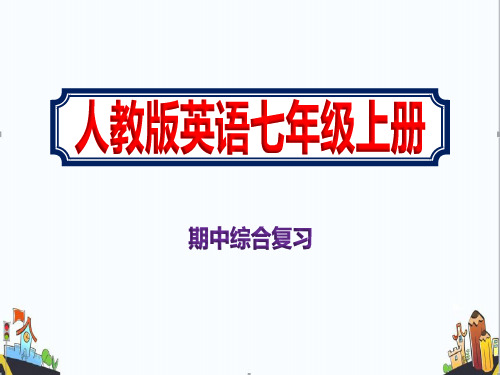
in China 在中国
知识点
⑴ Mr ,Mrs ,Miss 和Ms后接姓氏
eg. Mz Brown
Mr [‘mistə(r)] 先生
Miss [mis] 小姐,女士;(年轻未
婚女子)
Mrs [’misiz] 太太;夫人(用于已婚妇女姓名前) Ms. [miz] 女士
⑵ 英美人的姓名与中国人的姓名顺序相反,名在前,姓在后。如Jim Green, 名是Jim,姓
play computer games玩电脑游戏
lost and found 失物招领
a se
an eraser 一块铅笔擦
thanks… for…为…感谢
a photo of your family 你家人的照片=your family photo 你的全家福
am 上午
pm下午
PRC 中华人民共和国
cm厘米 RMB 人民币
PE体育课
Who’s = Who is He’s = He is What’s = What is That’s = That is it’s = it is
Who’re = Who are They’re =They are Where’s = Where is isn’t = isn’t not
tape player 录音机
model plane 飞机模型
some watches 一些手表
two dictionaries 两本字典
What / how about …? ……怎么样? ……又如何呢?
Excuse me.请原谅/打扰了
thanks = thank you 谢谢
Bye / Bye-bye / Good-bye 再见
2017年人教版初中英语七年级英语上册期中期末总复习课件(单元知识点归类总结)
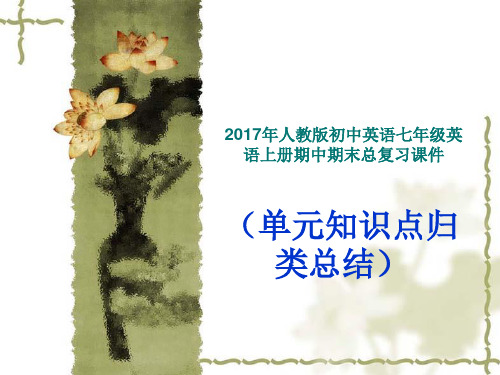
Liu(Lau)
last name
Dehua
first name
= family name(姓)
=given name(名)
3. first
name 名字 last name 姓氏 first name与given name同义, last name与 family name同义。 Her name is Mary Smith; Her family name is Smith. 她的姓名是玛丽· 史密斯, 史密斯是她的姓。
Telephone numbers
What’s your phone number?
It’s …/My phone number is … What’s his/her phone number?
It’s …/His/Her phone number is … phone number = telephone number
sister 姐,妹 brother 兄,弟 mother妈妈。母亲 father爸爸,父亲 parent父亲或母亲 grandmother祖母,外祖母 grandfather祖父,外祖父 grandparent祖父(母) family 家庭;家族; who 谁 those 那些 they 他们;它们;她们 these这些 well 好吧 have 经受;经历 day 一天,一日
Do you know them? 你认识他们吗?
Mr. White
怀特先生
Mrs. Green
Miss Black Ms. Brown
格林夫人
布莱克小姐 布朗女士
Notes:
Mr./Mrs./Miss/Ms. + last name
For example: Her name is Cindy White. We call her Miss White. The old man is John Smith. We can call him Mr. Smith.
2017-2018学年人教版初中英语七年级上册期中期末全套课时复习课件:Unit 6 Section B (1a-1e)
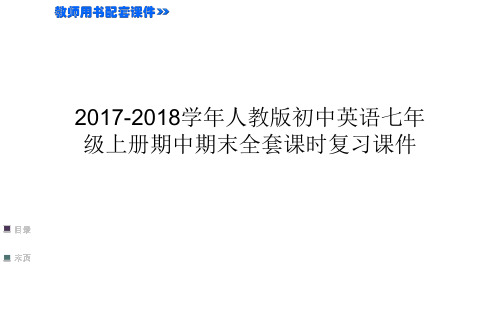
答案: 1. ice-cream
2. birthday
3. fruit
4. lunch
5. milk
Ⅱ. 情景对话 lunch, bread, about, them, for A: Hello, Li Ming. Do you lilike eggs and
通常加不定冠词a/an。
【归纳拓展】各种各样的“餐”
【学以致用】 I have lunch at school every day.
A. the
B. a
C. an
D. /
Ⅰ. 选择正确的单词填空 1. Lily 2. 3. His father 4. I often have eggs for 5. She doesn’t like (like/likes) chicken very much. (Do/ Does) the boy like carrots or bananas? (watches/watch) TV every day. (breakfast/the breakfast) . (tomato/tomatoes) .
B. eggs; chicken
D. apples; banana
B. Does; like
C. Do; likes
D. Does; likes
3. My cousin
A. like; like C. likes; likes 4. —Let’s play
oranges and I
pears.
B. like; likes D. likes; like . .
5 because they aren’t healthy. 4. 3. about 4. For 5. 5. them
2017-2018学年人教版初中英语七年级上册期中期末全套课时复习课件:Unit 5 Section A (Grammar Focus-3c)
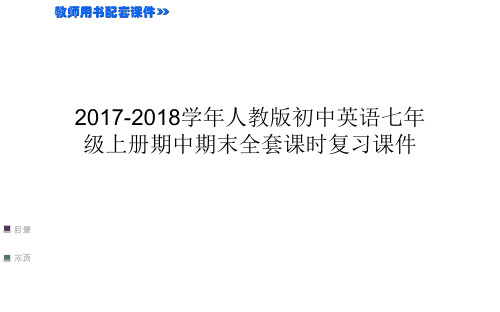
—That
2. My grandfather 3. Tom and Jim 4. —Let’s —That’s OK.
great.
a radio. He listens to it every day. a nice and big room. soccer.
5. —Do you have a ping-pong ball?
弄、摆弄某物”。
【学以致用】 ①Peter can play soccer ball, but he can’t play C. /; the chess C. /; with D. /; a his son. D. /; and
violin.
A. the; the A. the; and B. the; / B. the; with ②The father often plays
2017-2018学年人教版初中英语七年 级上册期中期末全套课时复习课件
Unit 5
Do you have a soccer ball?
Section A (Grammar Focus—3c)
1. play v. 参加(比赛或运动); 玩耍
【语境领悟】 *Let’s play! 让我们玩吧! *Let’s play basketball. 让我们打篮球吧。 *My sister plays the piano every day.
6. Does he have a notebook?
【知识构建】 一般现在时态中have的用法
have意为“有; 拥有; 占有”, 表示所属关系, 有人称和数
的变化, 其主语一般是人, 有时也可以是物。它的一般现在时 的各种句式如下:
1. 肯定句: 主语+ have/has. . . have 用于复数名词、第一、二人称单复数或第三人称复数代
2017-2018学年人教版初中英语七年级上册期中期末全套课时复习课件:Unit 9 Section B (1a-1d)
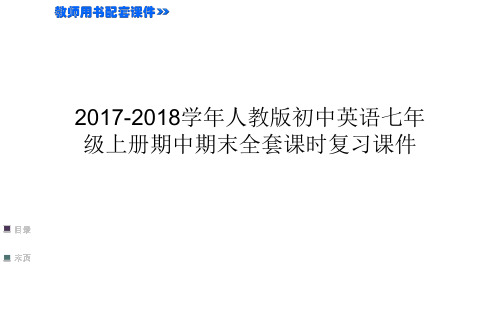
—Why
— it’s
he
.
math?
2. ——数学课在什么时候? ——它 (数学) 在星期三。 — is the math class?
—It’s
Wednesday.
2. When; on
答案: 1. does; like; Because; interesting
1. Our teacher is very busy every day.
二、时刻表示法 1. 表示几点钟用基数词加可以省略的 o’clock, o’clock或five。 2. 表示几点过几分 , 在分钟后加 past, 再加小时。 five past seven七点过五分, half past six六点半, a quarter past eight八 点过一刻, seven past eight八点过七分。 5: 00 读作 five
2. Wednesday
3. Thursday
5. 右边 3. 谈谈„„ 答案: 1~3. CAB
A. on the right
B. talk about C. soccer game
Ⅲ. 句型填词 1. ——他为什么喜欢数学? ——因为它 (数学) 有趣。
2. I think math is very difficult.
3. Is the movie boring? ____________________________________________________ 答案: 1. free 2. easy 3. interesting
4. We have a P. E. class at 8: 00 o’clock a. m. .
6: 31读作six thirty-one
2017-2018学年人教版初中英语七年级上册期中期末全套课时复习课件:Unit 5 Section B (2a-2c)
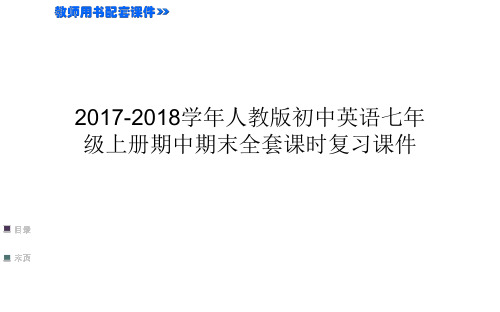
6. difficult (adj. )
7. they (pron. ) 答案: 1. 相同的 5. 同班同学 6. easy
→
→ 2. 体育运动 7. them 3. 只; 仅
(反义词)
(宾格) 4. 在„„以后
Ⅱ. 短语翻译
1. 在电视上
2. 下课后 3. 在同一所学校 答案: 1. on TV 2. after class 3. in the same school
Ⅲ. 句型填词
1. 在学校里我们和我们的朋友们一起踢足球。 We play soccer 看它们! our friends. 2. 我喜爱体育, 但是我并不进行体育活动——我只是在电视上
I love sports,
I don’t play them—I
!
watch
3. 我喜欢乒乓球。对我来说它很容易。 I like ping-pong. It’s easy 答案: 1. at school with 2. but; only; them on TV . 3. for me
1. After class, I play ping-pong with my
classmates. ______________________________________ 2. I only watch them on TV. ______________________________________
2017-2018学年人教版初中英语七年 级上册期中期末全套课时复习课件
Unit 5
Do you have a soccer ball? Section B (2a—2c)
Ⅰ. 单词拼写
1. same (adj. )
2017-2018学年人教版初中英语七年级上册期中期末全套课时复习课件:Unit 5 单元复习课
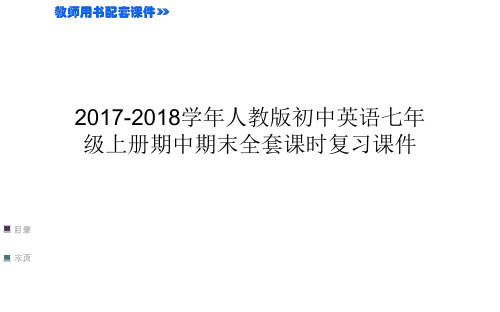
ts things.
答案: has
4. My parents have three basketballs. (改为否定句)
My parents three basketballs.
5. They have a volleyball. (改为一般疑问句) they 答案: 4. don’t have a volleyball? 5. Do; have
he
答案: 4. them 5. plays
TV every evening?
6. go to the same 7. Does; watch
Ⅵ. 词汇串记
Do You Have a Soccer Ball? Frank Brown 1 (没有) have a soccer ball, 3 2 (但是)
4. He likes apples and he eats
5. My father afternoon.
(they) every day.
(play) basketball with his friends every
6. 他们在同一所学校上学并且都喜欢打乒乓球。 They and both like to play ping-pong. 7. He watches TV every evening. (改为一般疑问句) school
2017-2018学年人教版初中英语七年 级上册期中期末全套课时复习课件
单元复习课 Unit 5
Ⅰ. 词汇速记 1. 网球 (n. ) 2. (英式) 足球 (n. ) 3. 排球 (n. )
4. 篮球 (n. )
5. 迟到 (adj. )
6. 去取; 得到 (v. )
答案: 1. tennis 6. get 2. soccer 3. volleyball 4. basketball 5. late
答案: has
4. My parents have three basketballs. (改为否定句)
My parents three basketballs.
5. They have a volleyball. (改为一般疑问句) they 答案: 4. don’t have a volleyball? 5. Do; have
he
答案: 4. them 5. plays
TV every evening?
6. go to the same 7. Does; watch
Ⅵ. 词汇串记
Do You Have a Soccer Ball? Frank Brown 1 (没有) have a soccer ball, 3 2 (但是)
4. He likes apples and he eats
5. My father afternoon.
(they) every day.
(play) basketball with his friends every
6. 他们在同一所学校上学并且都喜欢打乒乓球。 They and both like to play ping-pong. 7. He watches TV every evening. (改为一般疑问句) school
2017-2018学年人教版初中英语七年 级上册期中期末全套课时复习课件
单元复习课 Unit 5
Ⅰ. 词汇速记 1. 网球 (n. ) 2. (英式) 足球 (n. ) 3. 排球 (n. )
4. 篮球 (n. )
5. 迟到 (adj. )
6. 去取; 得到 (v. )
答案: 1. tennis 6. get 2. soccer 3. volleyball 4. basketball 5. late
- 1、下载文档前请自行甄别文档内容的完整性,平台不提供额外的编辑、内容补充、找答案等附加服务。
- 2、"仅部分预览"的文档,不可在线预览部分如存在完整性等问题,可反馈申请退款(可完整预览的文档不适用该条件!)。
- 3、如文档侵犯您的权益,请联系客服反馈,我们会尽快为您处理(人工客服工作时间:9:00-18:30)。
For girls, we have skirts
$20. 答案: 1. buy; at 2. sell; at 3. in purple for
only
①Can I help you?
②What can I do for you?
____________________________________________________ ____________________________________________________ 答案: 不一定。服务人员或营业员主动询问顾客需要的常用语 , 表示“你需要点什么吗? ”。如果顾客需要购物时, 可回答Yes,
2017-2018学年人教版初中英语七年 级上册期中期末全套课时复习课件
Unit 7
How much are these socks? Section B (2a—2c)
Ⅰ. 单词拼写 1. clothes (n. ) 2. store (n. )
3. buy (v. )
4. all (adj. ) 答案: 1. 衣服; 服装 2. 商店 3. 购买; 买 4. 所有的; 全部的
我们可以以优惠的价格买一些好的衣服。
【自主归纳】 (1) at very good prices意为“以合理的价格 (出售) ”。表示
“某物在……价位上”常用短语at/ for. . . prices。
at / for half/ full / a good / a low / a high price“以 (处于) 半/全/ 优惠/低/高价” (2) price为名词, 意为“价格”, 对某物价格提问用“What’s the price of. . . ? ”相当于How much +is/are+主语?
【自主归纳】 in+颜色名词, 表示“穿着……颜色的衣服”。
The girl in red is my sister. 穿着红色衣服的女孩是我姐姐。
介词in的不同用法
【归纳拓展】 介词in的不同用法
【学以致用】 穿黑色衣服的女孩是谁?
Who is the girl
答案: in black
?ห้องสมุดไป่ตู้
【备选要点】 1. a pair of 一双
【图解助记】
【学以致用】 How much (be) those pairs of trousers?
答案: are
2. Come and buy your clothes at our great sale! 快来买衣服吧, 我们在大甩卖! 【句型剖析】
(1) 此句为祈使句, 表示建议, 主语通常省略, 动词原形用于句
【语境领悟】
*I want to buy a pair of white socks. 我想买一双白色的袜子。 *Pairs of birds in the tree are singing. 树上成对的鸟儿在唱歌。
【自主归纳】 (1) a pair of意为“一对; 一双”, 一般用来修饰由两部分构成
for sb. 结构, 表示“替某人买东西”。 Please buy him a dictionary. =Please buy a dictionary for him. 请给他买本词典。
【温馨提示】 价格高或低只能用high或low, 而不能用expensive (昂贵的)
或cheap (便宜的) 。
【图解助记】
【学以致用】 The price of the car is ¥200, 000. (对画线部分提问)
of the car?
答案: What’s the price
2. in purple 身着紫色的衣服; 紫色的 【语境领悟】
5. very (adv. )
6. price (n. )
7. boy (n. ) 8. sell (v. ) 答案: 5. 很; 非常 → 6. 价格 (n. ) 特价销售; 出售 7. 男孩 8. sale
Ⅱ. 短语连线
1. 服装店
2. 一双; 一对 3. 紫色的 4. 以非常优惠的价格 答案: 1~4. BDAC
please. 否定回答可用: No, thanks.
1. at very good prices 以非常优惠的价格
【语境领悟】 *We buy them at a high price. 我们以高价买进它们。 *We can buy some nice clothes at very good prices.
首。 Come to Mr. Cool’s Clothes Store! 来酷先生的服装店吧! (2) buy意为“买; 购买”, 用作及物动词, 后跟名词或代词作 宾语。
I want to buy some apples. 我想买点苹果。
【归纳拓展】 buy的用法小结
buy后面还可以跟双宾语, 即用于buy sb. sth. 或buy sth.
A. in purple
B. clothes store C. at very good prices D. a pair of
Ⅲ. 句型填词 1. 快来买衣服吧, 我们在大甩卖! Come and We your clothes all our clothes our great sale! very good prices. 2. 我们以很优惠的价格出售我们所有的服装。 3. 对于女孩子, 我们有紫色的裙子, 仅售20美元。
*Who’s the girl in red? 身着红色衣服的女孩是谁?
*My pencils are in the bag. 我的铅笔在书包里。 *I can speak in English. 我会用英语讲。 *In the morning it can wake me up. 早晨它能叫醒我。
的单件事物, 如trousers (裤子) , shoes (鞋) , glasses (眼镜) ,
jeans (牛仔裤) 等。 (2) pairs of“成双的; 成对的”。
【温馨提示】 trousers; shoes; socks, shorts等用作主语时, 谓语要用复
数; 若与pair (s) of连用, 谓语一般应与pair的数一致。
